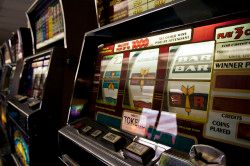Yet Another Study Says Casinos May Bring Economic Harm, But Not For The Pols Profiting Off Of It

The effort to pass a measure that would expand legalized gambling in New York State and see the construction of seven casinos is receiving a huge push from legislators and lobbyists. Despite the momentum, opponents of the measure continue to uncover new data suggesting the bill might not bring the economic boon promised and that politicians have already enriched their campaigns in fast-tracking the legislation from major gambling interests.
Earlier in the month, we reported that the casino ballot measure had majority support among voters, especially after the bill was presented to voters in glowing language that made the legislation seem like a no-brainer. The language surrounding the measure promises job growth, lower taxes and aid to schools. Times Union is reporting on a study put out by the Institute for American Values that notes that expanded access to slot machines would drastically increase gambling addiction:
Modern slot machines “engineer the psychological experience of being in the ‘zone’ — a trancelike state that numbs feeling and blots out time/space. For some heavy slot players, the goal is not winning money,” the study said.
Casinos depend on problem gamblers for their revenue base, drawing 40 to 60 percent of slot machine revenues from these people, many of whom are low rollers.
Living near a casino or working at a casino increases the chance of becoming problem gambler. Those who live within 10 miles of a casino are twice as likely to be a problem gambler than those who do not.
Problem gambling is more widespread than many casino industry leaders claim. The problem gamblers frequently go to a casino, and their lives and livelihoods may be adversely affected by their betting. They are not necessarily the heavy gamblers who are pathological and who suffer from increasing preoccupations to gamble and a loss of control.
The study also indicated the potential economic harm that increased access to legalized gambling would have on the state:
The benefits of casinos are short-term and easy to measure, but many costs pop up during the longer term that are harder to quantify. Economic stimulus fades after the casino becomes a dominant business that drives out established local businesses, such as restaurants, replacing them with pawnshops, auto title lenders and check-cashing stores. And since problem gambling develops over four to seven years, the stress on families and finances may gradually become apparent.
Geoff Freeman, the president of the American Gaming Association (AGA), a powerful gambling lobbying group, refutes the studies undertaken by the Institute for American Values:
“They believe their values are better than others. They’re trying to throw the baby out with the bath water,” Freeman told Times Union…
The American Gaming Association’s Freeman said the institute’s conclusions are based on tired arguments and inaccuracies. He said many communities benefit markedly from casinos, such as Bethlehem, Pa., Kansas City, Mo. and French Lick, Ind. He said he had not read Schull’s book on slot machine engineering, but that all technology has evolved. He said just 1 percent of the population have pathological addictions and that the other 99 percent should have the “entertainment they desire.” The AGA’s research points to 2 percent to 3 percent of the adult population having gambling problems.
Freeman was not able to estimate how much of the revenues of casinos come from problem gamblers. It would be in the billions, based on the institute’s estimates. In 2012 nationwide, tribal casinos collected $27.9 billion and commercial casinos accounted for $38.3 billion.
While it isn’t known for certain as to how much of a boon legalized gambling will be for the state, it is known how much money legislators have scored from gambling interests. According to a report in the Wall Street Journal, Governor Andrew Cuomo and politicians in the New York State Senate and Assembly have seen lots of cash flow into their campaign coffers from the gambling lobby. From 2011 to July of 2013, Cuomo has received $361,000 while the Legislature has taken in over $1 million in that time frame.
Common Cause, who conducted that study, noted that the law enacting the referendum had once prohibited politicians from receiving campaign contributions from the gambling lobby but that law was killed in closed-door talks.




